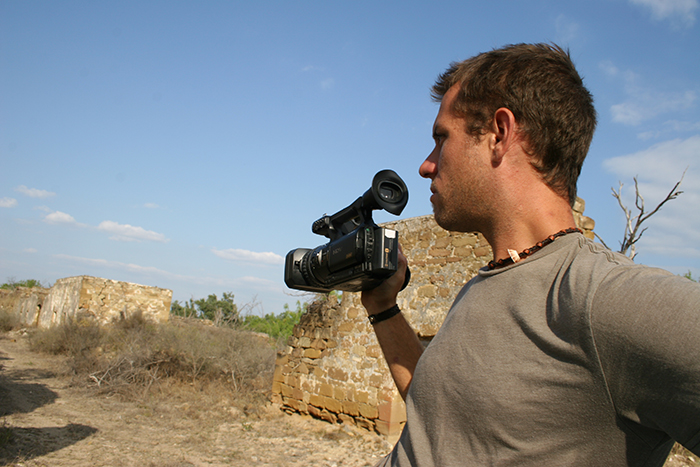Assistant Professor John Drew incorporates Border Stories, a documentary built on immigration stories on the U.S./Mexico border, into his journalism courses.
John Drew, who in Fall 2014 went from an adjunct professor to a full-time assistant professor in the College of Arts and Sciences‘ Department of Communications, is always on the lookout for ways in which to incorporate his—and his students’—experiences into his courses.
Border Stories
Drew, having won a $25,000 grant to produce a multimedia project along the U.S./Mexico border, said his 2008 photojournalism trip’s mission was “to help humanize relations with our southern neighbors.”
He added, “We traveled all 2,000 miles of the difficult terrain in search of stories” that, as the website borderstories.org put it, “portray the human face of this politically and emotionally charged region.”
The resulting Border Stories documentary consisted of interviews from both sides of the border, edited into nearly two dozen short video segments.
Describing this site as “a testament [to] the new reach of Internet-enabled journalism,” Drew said Border Stories was nominated in the best in online video journalism category by the Online News Association. He noted, “The fact that four independent journalists built a website on the fly and produced video content that ultimately put us in the same awards room as some of the most powerful media companies of our time [including award winners like The New York Times and The Washington Post] makes for a very exciting proposition among students looking to enter the world of digital media.”
For Drew, Border Stories’ co-producer/co-director/co-writer, telling ministories to make key points is working. He observed, “My own belief is that, both at the national and global levels, immigration is one of the most tragic issues of our time.”
Pointing out that there are more than 1 million refugees from Syria in Turkey right now, he said, “Our Border Stories project was recently asked to present in Turkey precisely because the issue of immigration is a global phenomenon and needs to be better understood.”
Students were not involved in his Mexican border photojournalism trip but, Drew said, “My work along the border continues. I am currently working on a short about human trafficking. And this summer, I hope to take at least one of my production students on a shooting/scouting trip.”
Beyond that, he said he “absolutely” tries to incorporate his Border Stories experiences into his classes. “I am constantly trying to inspire my students to become as digitally literate as possible and to start producing their own content that they can later market as evidence of their abilities.”
Cuba, six feet above sea level
Drew explained that he had hoped to teach an intersession course in Cuba in January 2015 titled Global Perspectives: Climate Change Reporting in Cuba, but, due to the lack of applicants, the course has been postponed one year. Due to insufficient promotion, the course drew nine applicants when 10 were needed. He hopes to double applicants in the coming year for the course, since renamed Global Perspectives: Cuba in Transition.
“One of the primary goals of the course,” Drew said, “is to introduce students to one of the most fascinating countries on the planet through the lenses of digital media and climate change, a subject about which the island nation of Cuba must be very proactive given that the nation’s capital rests less than six feet above sea level.”
He also visualizes that trip as a jumping-off point, so that his students can investigate other Cuba-related topics, such as what everyday life is like there. “Cuba,” he explained, “is one of the few places where the conversation of socialism versus capitalism is still incredibly relevant, timely and visible on a daily, household-to-household basis.”
Next year, he added, “We are going down, armed with digital video and camera equipment, and we intend to build a website showcasing the stories [that] the students capture while they explore the country and grapple with the curriculum.” This project will be along the lines of borderstories.org.
For further information, please contact:
Todd Wilson
Strategic Communications Director
p – 516.237.8634
e – twilson@adelphi.edu
